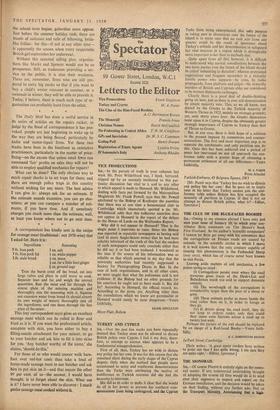TURKEY AND CYPRUS SIR,—Over the past few weeks you have
repeatedly insisted that Turkey must not be allowed to dictate British policy over Cyprus. I feel it my duty, there- fore, to attempt to correct what appears to be a fundamental misapprehension.
First of all, then, Turkey has no wish to dictate any policy but her own. It was for this reason that she remained silent during the early stages of the'Cyprus dispute. Only when she realised that people more accustomed to noisy and vociferous demonstrations than the Turks were attributing the motive of indifference to Turkish restraint did she feel the necessity to intervene.
She did so in order to make it clear that she Would do all in her power to prevent her southern com- munications from being endangered, and the Cypriot Turks from being exterminated. Her only purpose in taking part in discussions over the future of the island is to make sure that no rash acts from any quarter could be the result of ignorance about Turkey's attitude and her determination to safeguard her vital interests in a region which is strategically more important to her than to anybody else.
Quite apart from all this, however, it is difficult to, understand why normal consultations between the two main parties over the future of the island should be called `submitting to dictation'; whereas protracted negotiations and frequent surrenders to a violently' hostile power who supports—by arms, by radio propaganda, from platform and pulpit—the cowardly murders of British and Cypriots alike are considered to be normal diplomatic exchanges.
Clearly there is a good deal of double-thinking going on here, just as there is over self-determination by simple majority vote. This, as we all know, was denied by the Greeks to the Turkish majority of Western Thrace in 1923, mainly on strategic grounds; yet, only thirty years later, the Greeks themselves insist upon it in Cyprus, despite the obviously greater strategic importance of Cyprus to Turkey than that of Thrace to Greece.
But, in any case, there is little hope of a solution to the present impasse by accusations and counter- accusations. The first and most important step is to separate the combatants, and only partition can do this. Once this has been achieved and a period of peace has intervened we can all approach the con- ference table with a greater hope of obtaining a permanent settlement of all our differences.--yours faithfully,
M. A. PAMIR Press Attachd Turkish Embassy, 43 Beigrave Square, SW!
[Mr. Pamir says that 'Turkey has no wish to dictate any policy but her own.' But he goes on to imply later in his letter that Turkey cannot join the con- ference table unless Britain has first accepted the necessity of partition in Cyprus. If that is not an attempt to dictate British policy, what is?—Editor, Spectator.]






































 Previous page
Previous page